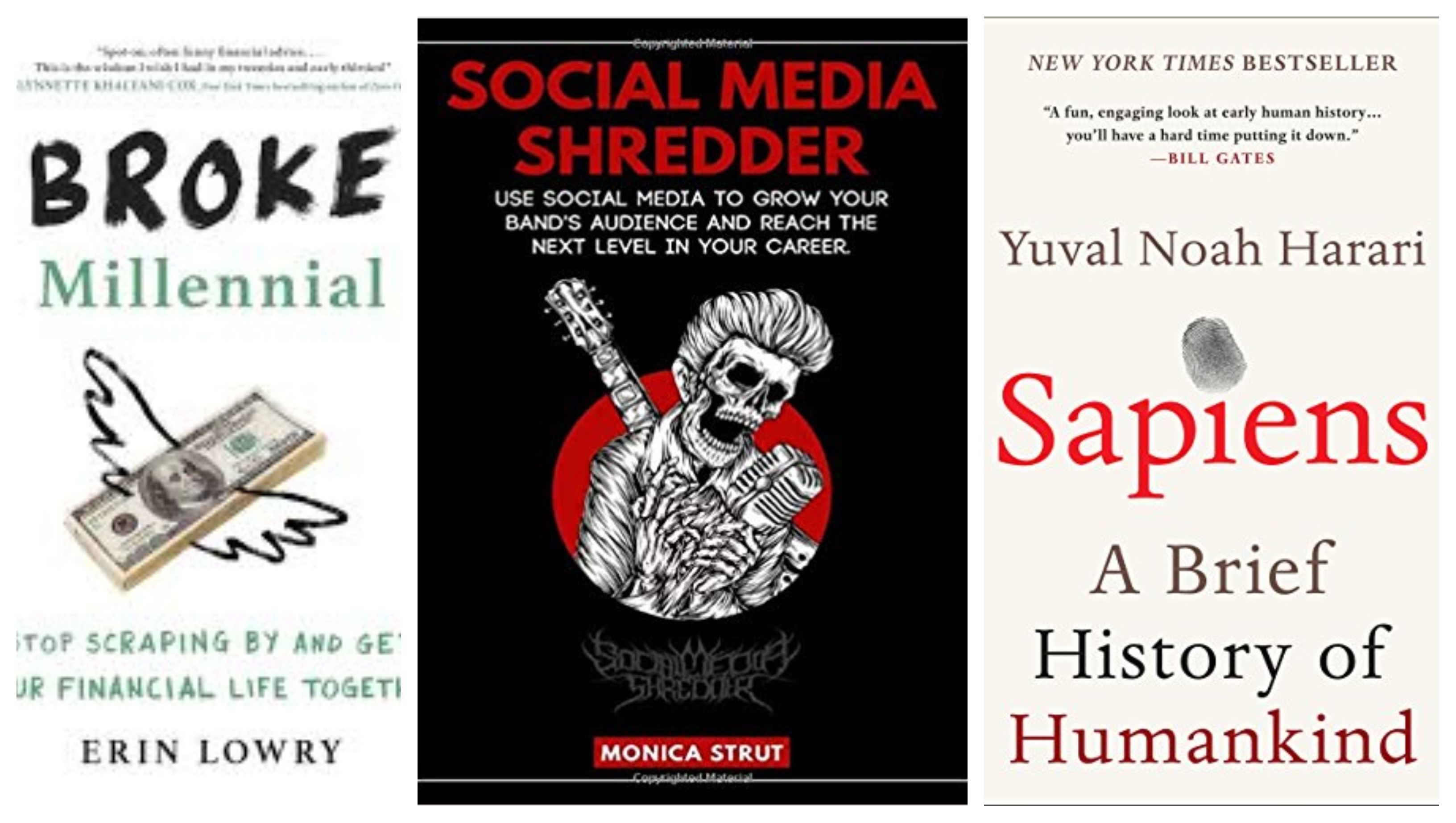“What Jessie May is reading” might end up in the No One Cares File for most people… But if you’re not one of those people, read on!
I’ve been working on a column series called Money Hacks for Metalheads and Old Millennials, which I would like to expand and turn into an ebook — so I figured I better actively start examining some finance books that are directed at the 20-something to approaching-40 audience. I heard about Broke Millennial: Stop Scraping By and Get Your Financial Life Together (2017) on Twitter and gave it a whirl courtesy of my local library. Author Erin Lowry gives a humorous and practical intro to personal finance from a Millennial perspective, addressing topics like how to set freelance rates and getting out from under student loans in addition to the regular “contribute to your 401K” stuff. There’s even a chapter on negotiating the dynamics of living at home as an adult, which is a reality for many young people in our generation — and a great way to knock out those student loans, like it or not.
The best thing about this book, as a Washington Post reviewer put it, is that it’s “well-written and researched by a millennial for millennials.” There are enough old man finance books and articles in the world that scoff at people our age as avocado-toast-loving spendthrifts, so it was refreshing to read something that acknowledged the financial climate that Millennials exist in rather than blaming imagined brunch habits for our challenges. If you want an introduction to personal finance without getting “boomersplained” — my new favorite term, borrowed from @ThatsNotMetal on Twitter — Broke Millennial is a worthwhile read. Lowry also has a new book called Broke Millennial Takes On Investing — my cheap ass is waiting for it to become available at the library, but I definitely want to read it.
Another recent reading endeavor was Sapiens: A Brief History of Humankind by Yuval Noah Harari (2015), recommended by my brother Chris. Spoiler alert, Harari has a dim outlook on pretty much everything humans — or sapiens, specifying the species of Homo that we are — have ever done. The book starts is divided into sections based around the Cognitive, Agricultural, and Scientific Revolutions. Harari theorizes that sapiens persisted while other Homo species died out because we are the only animals with an “ability to invent fiction(s)” such as money, religion, and government — which in turn allow us to organize ourselves into larger units than any other animals.
There are many “ah-ha moments” in this book, as well as parts where things you already kinda knew are explained in an academic manner (like how religion is made up). Harari doesn’t specifically offer suggestions for improving the human trajectory — but if he was going that route, I suspect that mass veganism would be near the top of his list. After his justified skewering of industrial agriculture, this guy better be a vegan or lovingly raise his own farm animals, or I call bullshit. Anyhow, Sapiens is not a breezy read, but a thought-provoking and valuable one. And re not having suggestions for improvement, Harari came out with a book in 2018 called 21 Lessons for the 21st Century — that one’s going on my reading list!
The last book I read was about something that’s consuming my life of late: social media. Social Media Shredder by Monica Strut is a 50-page guide for bands who want to use social media in a purposeful way. In the introduction, Strut reminds readers that good social media is no substitute for good music — rather, social media helps good music reach more people. She lays out strategies for Facebook, Instagram, and Youtube, and also goes into how to create an image for your band, all while emphasizing teamwork between band members. I may not be ready to live my “band look” at age 35, and I suspect Strut will be adding more Twitter information to her lineup in the future, but this is an insightful guide for anyone who wants their band to be more than a hobby. PS: Want to find out about “the biggest untapped resource for growing your audience”? You’ll have to buy the book, but I will say that it’s one many bands (including my own) underutilize.
PS: Curtis Dewar and Matt Bacon interviewed Strut recently on their Dumb and Dumbest podcast. Listen below!
What are you reading these days? Leave a comment!
Social Media Shredder ebook courtesy of Dewar PR. For more from Alternative Control, find us on Facebook, Twitter, Instagram, Soundcloud, and bandcamp.






1 comment
Comments are closed.